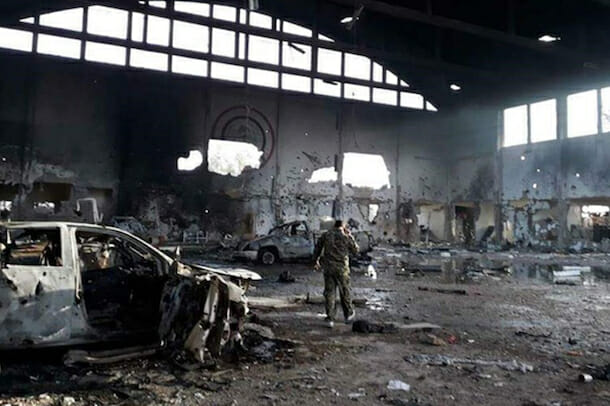
Is War Between Israel and Iran Inevitable?
In the wake of the Israeli strike on the T-4 airbase in Syria two weeks ago in which seven Iranian Revolutionary Guard Corps soldiers were killed and the escalating warnings and counterwarnings emanating from Tehran and Jerusalem, there is a growing sense that sustained military conflict between Israel and Iran is on the horizon. Writing in the New York Times on Sunday, Tom Friedman predicted that the “quiet phase” during which Israel and Iran clashed indirectly is over, and that the IRGC Quds Force’s determination to attack Israel directly along with Israel’s resolve to respond mean a potentially explosive escalation.
There is no question that tension between Israel and Iran is at its apex, and for the first time in their histories, the two countries have recently clashed openly and directly; Iran with its penetration of Israeli airspace in February by an armed drone, and Israel with its strikes on IRGC positions and personnel inside of Syria. But despite the very real risk of these periodic clashes snowballing into a larger sustained war, there are mitigating factors against escalation that may render the current level of conflict an anomaly rather than a harbinger of what is to come.
Israel’s more muscular approach to countering Iran in Syria is aimed at deterring future Iranian threats and expansionism rather than an effort to bait Iran into a war against a stronger and more experienced Israel. Israel’s previous tactical approach, consisting of setting public red lines and then acting to enforce them through strikes on Iranian convoys of advanced weaponry bound for Hizballah in Lebanon and destruction of Iranian military sites under construction in southern Syria, was effective in rolling back nascent Iranian gains but less effective in discouraging future Iranian behavior. Israel was effectively setting the clock back to zero with each strike but not turning off the stopwatch.
Recent Israeli actions have had a different flavor. Israel’s response to the Iranian drone was to strike at the T-4 base from which it originated rather than just downing the drone itself, and its April 9 strike on the same base was noteworthy for its targeting of IRGC personnel and the commanding colonel of the drone unit rather than simply targeting weapons or infrastructure. The April 9 action was followed by explicit threats to bring down the Assad regime if Iran responded in any meaningful way to the T-4 operation, which established a new public threshold set by the Israeli government. Israel’s publishing of photos and maps of Iranian bases in Syria on Tuesday was also a new and more confrontational step. The aim of all this is to keep Iran from testing Israel further than it has, and apply the threat of the Dahiya doctrine – using disproportionate force particularly targeting a wide array of necessary infrastructure – that has been credited with keeping the Lebanese front quiet since the 2006 war to the new front in Syria. Israel is betting that Iran is absorbing the new uptick in Israel’s response to Iranian provocations, and will turn back.

Given effective Israeli deterrence against Iranian proxies in Lebanon for over a decade, there is already cause to believe that more aggressive Iranian behavior in Syria can be deterred. But there is also the added component of recent Iranian failures and whether in light of these, Iran wants to push the envelope further. Iran’s drone boundary-testing was an unmitigated disaster; not only did Israel neutralize the drone before it attacked any Israeli targets, it tracked the drone from takeoff and immediately responded by hitting the base from which it originated. The entire incident demonstrated Iran’s weakness while showcasing the strength of Israeli intelligence. Iran has also failed to protect its core assets in Syria from Israeli offensives, and aside from demonstrating a desire to establish forward bases in Syria from which to harass Israeli, it has not yet proven that it can utilize those positions in any meaningful way. Getting into a sustained and hotter war with Israel given the absence of a successful track record when trying to operate more under the radar seems unwise.
There is also a Russian angle to this, as Iran’s freedom of movement in Syria is not unconstrained. Israel’s military actions and public messaging have been aimed as much at Russia as they have at Iran in an effort to drive a wedge between the two while communicating to Moscow that its core interests in Syria may be threatened by Iranian adventurism. Iran wants the Assad regime in power so that it can extend its influence within the region through a network of Shia dominated states and maintain its direct supply line to Hizballah in Lebanon. Russia wants the Assad regime in power not because it has any great love for Assad and what he represents, but because it views a unified and stable Syria as the key to its own foothold in the region and believes that Assad has a better chance of pulling this off than any of the opposition groups. Israel’s threat to bring Assad down should Iran use Syria as a base from which to attack the Israeli home front is a bet that Russia will not allow this to happen. Since the Russian-Iranian alliance in Syria is based on a convenience of mutual interests rather than a true strategic partnership, Israel is reasonably hoping that Russia will lean on Iran in order to protect its own goals and interests in Syria that will be threatened by all-out hostilities between Israel and Iran.
None of this means that Israel should drop its guard or be sanguine about Iranian actions in Syria. Iran’s obsession with Israel is why it wants to dominate Syria in the first place, and obsessions are dangerous precisely because they distort reality or any rational calculation of what is achievable. Nonetheless, effective deterrence and pressure from outside powers are the two best ways to avoid wars, and in the case of Israel and Iran, both are at work. While the chances of a real Israeli-Iranian fight are alarmingly high, it is not an inevitability.
This article was originally posted in Ottomans and Zionists.

